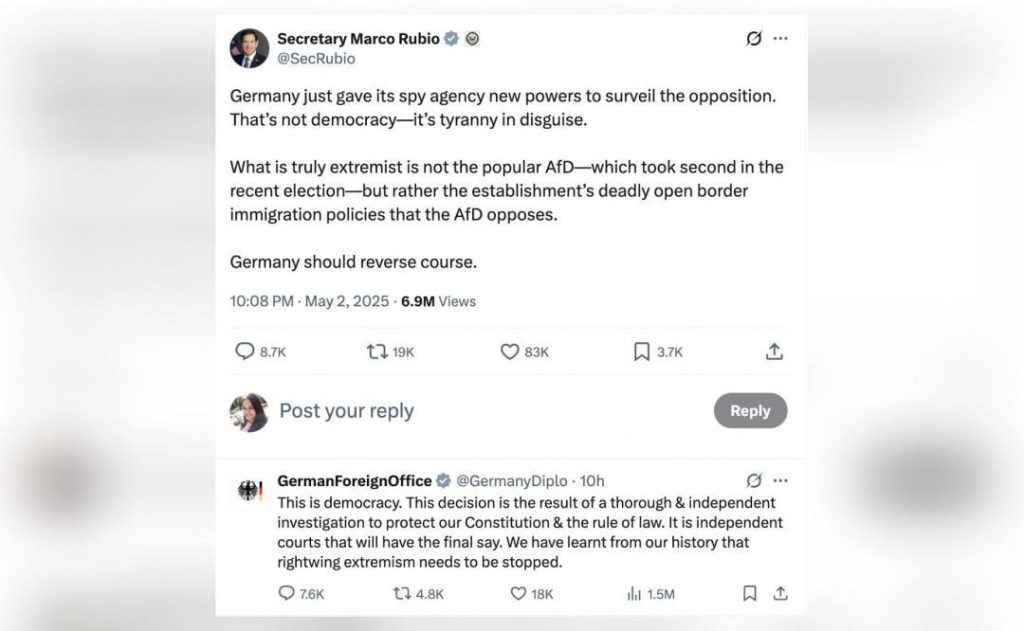
US Secretary of State Marco Rubio and German Foreign Ministry Clash Over AfD Party’s ‘Extremist’ Tag
A heated controversy has erupted between US Secretary of State Marco Rubio and Germany’s Foreign Ministry over the designation of the far-right Alternative for Germany (AfD) party as “extremist”. The spat began after Germany’s domestic intelligence agency, the Federal Office for the Protection of the Constitution (BfV), declared the AfD party as “extremist” due to its perceived anti-constitutional activities.
In a strongly-worded statement, US Secretary of State Marco Rubio accused Germany of enabling “tyranny in disguise” by labeling the AfD party as extremist. Rubio’s remarks sparked a fiery response from Germany’s Foreign Ministry, which defended the decision, stating that it was the result of a thorough investigation aimed at protecting the country’s Constitution.
The controversy highlights the increasingly complex relationships between European countries and the United States, particularly in the realm of political ideologies and definitions of extremism. It also underscores the growing concerns about the rise of far-right parties across Europe and the potential threat they pose to democratic institutions.
The AfD party, which was formed in 2013, has been a dominant force in German politics, with its anti-immigration and anti-Islam rhetoric resonating with many Germans. While the party has not been accused of violent extremism, its ideology has been criticized for being intolerant and divisive.
Germany’s BfV intelligence agency has been monitoring the AfD party since 2013, and in February 2022, it declared the party as extremist, citing its alleged anti-constitutional activities, including attacks on democracy, the rule of law, and human rights. The agency’s decision was based on a comprehensive investigation that revealed a significant number of AfD party members and supporters were involved in extremist activities, including spreading hate speech and promoting violence against minorities.
However, Rubio’s statement accused Germany of unfairly targeting the AfD party, saying that the designation was a “dangerous” and “unfair” attempt to muzzle political opposition. He argued that the US has a different approach to defining extremism, which focuses on violent activities rather than political beliefs.
“The decision to label a political party as ‘extremist’ is a serious matter that requires careful consideration and a clear definition of what constitutes extremism,” Rubio said. “Labeling a political party as ‘extremist’ without a clear definition of what that means is a recipe for tyranny in disguise.”
Germany’s Foreign Ministry responded to Rubio’s statement, saying that the decision to declare the AfD party as extremist was made after a thorough investigation and was aimed at protecting the country’s Constitution. “The German government is committed to protecting the constitutional order and democracy,” a spokesperson said. “The decision regarding the AfD is a result of thorough investigation to protect our Constitution.”
The controversy has sparked a broader debate about the definition of extremism and the role of governments in monitoring and regulating political parties. Some experts argue that the AfD party’s ideology is fundamentally incompatible with democratic values, while others argue that the designation of a political party as extremist is a slippery slope that can lead to the suppression of political dissent.
The dispute between Rubio and Germany’s Foreign Ministry highlights the challenges of navigating complex political issues across different cultural and ideological contexts. While the US and Germany share a commitment to democratic values, their approaches to defining extremism and regulating political parties differ significantly.
In conclusion, the clash between US Secretary of State Marco Rubio and Germany’s Foreign Ministry over the AfD party’s “extremist” designation is a complex and multifaceted issue that requires careful consideration of the political, cultural, and ideological contexts in which it arises. As the world grapples with the rise of far-right parties and the challenges of defining extremism, it is essential that governments and international organizations work together to develop a common understanding of these issues and to promote democratic values and principles.



